Fin de la communauté juive de Raciąź en Pologne
A ma connaissance il existe deux témoignages de la fin de la communauté juive de Raciaz. Les deux sont écrits dans le Mémorial, le Yizkor Book, l'un de Jacob Greenshpan, l'autre d'Abraham Isaiah Altus, publié à Tel Aviv en 1965 en hébreu, yiddish et anglais. La communauté de Raciaz datait du tout début du XIXè siècle. Selon l'historien Daniel Tollet, elle comptait 1190 âmes en 1865, soit 50% de la population totale de la ville. Elle prit fin dès le début de la guerre, fut dispersée dans les différents ghetti des villes environnantes, notamment à Plock et à Varsovie. Certains qui avaient trouvé refuge en France avant la guerre furent déportés du camp de Drancy, comme le montre le Mémorial des déportés de France de Serge Klarsfeld.
Ce qui frappe dans ces témoignages, c'est la volonté criminelle immédiate des nazis dès l'instant où ils arrivent. Ils sont présentés comme des tueurs venant commettre leurs meurtres prémédités de longue date avec des comportements sadiques stéréotypés qu'on rencontre partout en Pologne dans les témoignages et dont les images de l'époque témoignent. La volonté criminelle accompagnée du désir sadique de faire souffrir avant de tuer apparaît comme le fruit d'une éducation et d'une volonté organisée qui se porte garante du bien-fondé de telles actions, pas comme le fruit d'un comportement hasardeux et individuel qui par un emballement de la machine de guerre aurait produit la Shoah.
Comme ces témoignages ne sont guère accessibles qu'en bibliothèque en Israël, je les mets en ligne tels qu'ils ont été publiés en anglais, pour ceux que ça intéresse et qui le lisent couramment, réservant la traduction pour plus tard.
****************
The nazi invasion of Raciaz
par Abraham Isaiah Altus
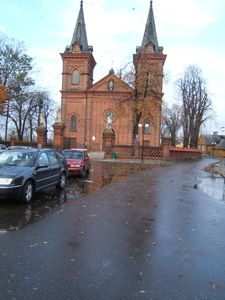 On 1st. September 1939 German aeroplanes dropped bombs on the church and hit, and on the railway and missed. In town people scarcely knew that war had broken out. The ignorant Poles claimed that these bombs had been dropped by Polish soldiers carrying out maneouvres in the neighbourhood, which had fallen in town by mistake and not done damage.
On 1st. September 1939 German aeroplanes dropped bombs on the church and hit, and on the railway and missed. In town people scarcely knew that war had broken out. The ignorant Poles claimed that these bombs had been dropped by Polish soldiers carrying out maneouvres in the neighbourhood, which had fallen in town by mistake and not done damage.
On Friday morning we were standing praying in the large handsome new Bet Hamidrash, when bombs were dropped on the railway once again. It will be remebered that Friday was market day in Raciaz. There was a great panic and confusion. The Poles of the town and the vicinity abandoned their goods and fled for their lives. That day a rumour spread that Todrung, a doctor who was the son of one of the squires and spoke German, was suspected of spying for the Germans. The Poles arrested him and sent him to Warsaw on the Saturday. It was felt that the Front was aiming at Warsaw, and that all the bombardments were outside our town. On Friday morning it was learnt that Mlawa near the frontier had already been burnt, and the Jews from there had fled to Strzegowo. When Strzegowo was also bombed the Jews began fleeing to Raciaz. Many of them were killed by bombs on the way. That same day the Polish Mayor Tuszinski ordered that the town should be abandoned,
and we should run away to the region beyond the River Vistula. But there were no vehicules, for all the vehicules had been requisitioned by the Polish Army.
The Raciaz physicians, Dr. Blauman and Dr. Zhilinski, fled at once. The Polish school in he market-place was immediately transformed into a hospital. On Monday the Havra Kedisha set out along the roads, gathered Jewish corpses and buried them in the cemetary.
transformed into a hospital. On Monday the Havra Kedisha set out along the roads, gathered Jewish corpses and buried them in the cemetary.
All the Raciaz people sat at home. On that day one of the Hevra Kedisha said that German soldiers were approaching town. But the Nazi German army entered only on Wenesday. In the market they met Batya Freide the daughter-in-law of Lipinski, and Israel Teitelbaum and the son-in-law of Jacob Meyer. They shot them at once and wounded them. The first one injured was Abraham Rosenberg who was the head of the community. They slapped him in the face.
On that day young underworld rogues told the invaders which were the Jewish shops. They burst at once into the shop of Hershel Lipinski and other shops, and threw the wares into the street for the hooligans. On Monday German troops passed through on their way to Warsaw, along the Warsaw Road. The invasion continued like that until the Eve of the New Year 5700. On the New Year we still manage to say prayers in an orderly fashion in the synagogue. There was no authority in town, neither Polish nor German. Meanwhile the Germans sent members of the Wehrmacht, people from Czechoslovakia, quiet folk, as temporary police. Then the shops were opened and trade began again in town.
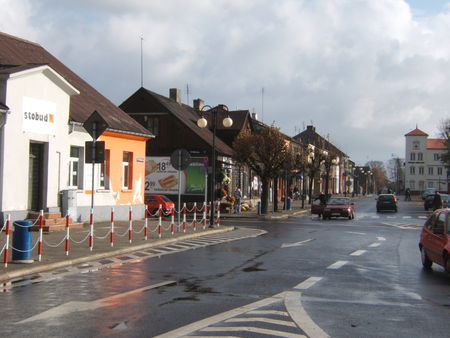 On Yom Kippur Eve, in the morning the S.S. men came and brought an order to the Rabbi, Red Dov Berisch Neufeld of blessed memory and the Communal Secretary Benjamin Yankelevitch of blessed memory (son of Shabtaï) that all the Jews were to cut off their beards that day. Otherweise they would be punished with all the severity of the law, even with death. The sight of the wanton destruction of the faces and likenesses of Raciaz Jewry was terrifying. And equally terrifying was the appearence of Reb Yitzhak Mordechai Zlotnik of blessed memory. But he raised our spirits when he appeared before us with his fine beard cut off and wearing a Polish work cap. He turned to us with a cheery laugh and said: "We musn't lose heart or be downcast. The beards will grow again God willing, but we mustn't despair." And he drove the alarm and unhappiness away.
On Yom Kippur Eve, in the morning the S.S. men came and brought an order to the Rabbi, Red Dov Berisch Neufeld of blessed memory and the Communal Secretary Benjamin Yankelevitch of blessed memory (son of Shabtaï) that all the Jews were to cut off their beards that day. Otherweise they would be punished with all the severity of the law, even with death. The sight of the wanton destruction of the faces and likenesses of Raciaz Jewry was terrifying. And equally terrifying was the appearence of Reb Yitzhak Mordechai Zlotnik of blessed memory. But he raised our spirits when he appeared before us with his fine beard cut off and wearing a Polish work cap. He turned to us with a cheery laugh and said: "We musn't lose heart or be downcast. The beards will grow again God willing, but we mustn't despair." And he drove the alarm and unhappiness away.
*
On the morning of Yom Kippur an order was received from the S.S. that all the Jewish men were to appear at precisely eight o'clock next to the house of Shlomo Cohen, and whoever stayed at home would be shot. (Meanwhile Todrung the physician, an exceptional Jew-hater, had been appointed Mayor by the nazis and the Municipality was set up in his home.) At eight o'clock in the morning all the Jews gathered in the market. The S.S. men ordered us to line up in fours, in alphabetical order. I came first, with my father and Sender Aharonovitch. We arranged ourselves that way. The teacher Karnishin came out of line on that occasion — he was the son-in-law of Summer — and asked his father to be excused as he was ill for not coming to the market. The nazis promptly fell on him and beat him murderously.
he was ill for not coming to the market. The nazis promptly fell on him and beat him murderously.
The women, who were afraid for their husbands, reckoning that they were all being taken away to execution, stood in the house entries with their children in their arms and wailed bitterly. They were promptly ordered to get inside and close the doors in their homes.
All the Jews standing in line were led to the Mlawa road. It was a very depressing and despairing feeling. We thought that we were being led to the cemetery where they would shoot us. From there we were directed to the courtyard of the Polish school, where they closed the gate on us. Here all the Jewish population were registered. It took until twelve noon. And an order was issued on the spot: To fetch all the spirits and liquor to the courtyard of the school and go back home and then return two hours later, every one of us with a broom. (We were about a thousand Jewish men.)
When we came back in the very middle of the Holy Day carrying the brooms, our hearts bleeding with shame and blood, we were lined up in front of big dustcarts. The old and weak Jews in particular were harnessed to them and made to drag the carts from place to place, while the rest swept and loaded the refuse on them. Since the nazis were drunk with the spirits and liquor they cruelly thrashed the old men, while some stood photographing in order to perpetuate these scenes of horror and hell. Between the beating and the photographing they made us dance and jump and hit us with sticks and mistreated us, and tormented us as much as they could before the eyes of the antisemitic hooligans of Raciaz who  enjoyed the scenes. This degradation went on until six in the evening, the time for the Neila Prayer. Bleeding and abased to the very earth, desolate and broken and confused, we were no longer capable of standing and praying. Our spirits were numbed and our eyes were closed against tears.
enjoyed the scenes. This degradation went on until six in the evening, the time for the Neila Prayer. Bleeding and abased to the very earth, desolate and broken and confused, we were no longer capable of standing and praying. Our spirits were numbed and our eyes were closed against tears.
So we simply lay on the floor at home. After we had rested a while and our spirits returned to us, then we burst out weeping, weeping without a break like forsaken children.
Early in September the Rabbi and Community Secretary were again summoned to the S.S. and were given an order for all the Jews in town to go to the market-place. Levi Yitzhak the Beadle went with his wooden hammer knocking at every door and every shop, shouting: "Jews, into the street! S.S. orders! Anyone who doesn't come out will be shot and killed!"
and every shop, shouting: "Jews, into the street! S.S. orders! Anyone who doesn't come out will be shot and killed!"
By ten in the morning all of us were out in the market-place. Anyone who came after that was set on one side. My brother the late Joseph Leib Koshziba and Rotman the son-in-law of Knester were both lte and were beaten for it. Then a chapter of mishandling and torment began. They put us through insulting and degrading gymnastic exercises and ordered us to lie down on the ground while they trampled over us. They also ordered the Jewish Elders to run the length of the market-place, and beat them with rifle-butts. This torment went on until noon, and about a thousand of us Jews were ordered to come back in the afternoon too.
That day an incident happened which we regarded as the finger of God: the S.S. officer ordered the Jews to return through the way opposite the side where they stood. Even those Jews who lived on that side had to go all round the 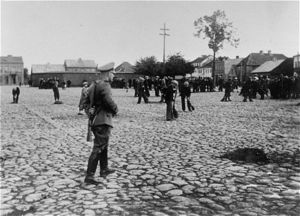 market square and come back along the other side. A state of confusion ensued. The S.S. officer drew his pistol and prepared to shoot into the dazed crowd, but a miracle happened and the bullet hit his own hand.
market square and come back along the other side. A state of confusion ensued. The S.S. officer drew his pistol and prepared to shoot into the dazed crowd, but a miracle happened and the bullet hit his own hand.
When we came back in the afternoon to sweep the market again and drink the goblet of maltreatment to the dregs once more, the S.S. men vented their fury on us for the accident to their officer's hand and the beating was worse than before. On that occasion the horror reached one of its peaks and when I remember it my tears still choke me.
The S.S. took from the ranks the son-in-law of Mendel Plinsker, Itsche Rosental the tailor, and Abraham the rabbi's son. They tied theirs hands with rope and called to the Rabbi to say goodbye to his son in order to lead them off to Plonsk. One of them was hit so savagely in his face that a jet of blood burst from it. We were shaken and our eyes grew dark with hame and pity.
*
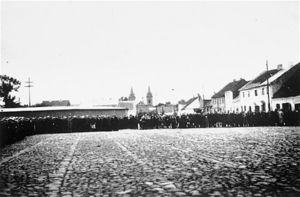 On the first day of Sukkot 5700 the Rabbi and Secretary of the community were again summoned to the S.S. men and the antisemitic Mayor and were told that all the Jews must leave Raciaz within four days, that is until the 25th October. Then we were also permitted to take property with us. There was a state of tumult and confusion among the Jews, for there were no vehicles and we had a vast number of old people and children and sick. We were ordered to go in the direction of Poltusk, which was near the Russian frontier. A commitee of Raciaz Jews was set up on the spot and proclaimed: Let no man leave the town himself, but let us all go together like those who left Egypt, and any vehicles should be made available for those who need them most. A big money-raising campaign was also conducted and the money was used for acquiringhorses and carts in which to place women, old people and children.
On the first day of Sukkot 5700 the Rabbi and Secretary of the community were again summoned to the S.S. men and the antisemitic Mayor and were told that all the Jews must leave Raciaz within four days, that is until the 25th October. Then we were also permitted to take property with us. There was a state of tumult and confusion among the Jews, for there were no vehicles and we had a vast number of old people and children and sick. We were ordered to go in the direction of Poltusk, which was near the Russian frontier. A commitee of Raciaz Jews was set up on the spot and proclaimed: Let no man leave the town himself, but let us all go together like those who left Egypt, and any vehicles should be made available for those who need them most. A big money-raising campaign was also conducted and the money was used for acquiringhorses and carts in which to place women, old people and children. 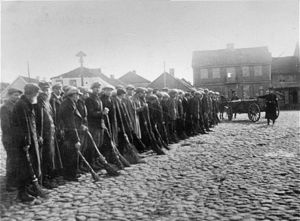 It was decided that the men would go on foot. In this way horses and carts were obtained and the rich people of Raciaz purchased vehicles for themselves. But nobody dared to leave the town alone. As for the goods in the shops, the Jewish commitee announced that before leaving the shops would be open to every needy person and every Jew could take whatever he wanted. Also they called on them to provide themselves with as much food as they could. Money was plentiful from every side, without any limit. But during the three half-festival days a delegation of women went to Sierpce. It included Charna Zemelman, Zippa Pszedecki and the daughter-in-law of Wior and others. They went to the German Starosta in Sierpce and offered him 25,000 zloty as ransom money and to get the expulsion order abolished. They collected the whole amount, went there and the decree was annulled.
It was decided that the men would go on foot. In this way horses and carts were obtained and the rich people of Raciaz purchased vehicles for themselves. But nobody dared to leave the town alone. As for the goods in the shops, the Jewish commitee announced that before leaving the shops would be open to every needy person and every Jew could take whatever he wanted. Also they called on them to provide themselves with as much food as they could. Money was plentiful from every side, without any limit. But during the three half-festival days a delegation of women went to Sierpce. It included Charna Zemelman, Zippa Pszedecki and the daughter-in-law of Wior and others. They went to the German Starosta in Sierpce and offered him 25,000 zloty as ransom money and to get the expulsion order abolished. They collected the whole amount, went there and the decree was annulled.
 One month later the same delegation of women was invited to Sierpce again, and another 25,000 zloty were demanded as ransom. But all the bribes and money that the nazis sucked out were only for delay, in preparation for the execution of their final purpose. On the 9th November 1939 all the men were taken to the Beth Hamidrash and the women to the synagogue, and were ordered to bring all their jewellery and their money to be assessed. They stripped one woman nacked and dressed her in the mantle of a Torah Scroll, compelled her to dance in front of the S.S. men, and kept them like that till it was almost dawn. Then they allowed an hour or two and told them that in the morning every family had to prepare one bundle only and leave the town and go wherever their feet could take them.
One month later the same delegation of women was invited to Sierpce again, and another 25,000 zloty were demanded as ransom. But all the bribes and money that the nazis sucked out were only for delay, in preparation for the execution of their final purpose. On the 9th November 1939 all the men were taken to the Beth Hamidrash and the women to the synagogue, and were ordered to bring all their jewellery and their money to be assessed. They stripped one woman nacked and dressed her in the mantle of a Torah Scroll, compelled her to dance in front of the S.S. men, and kept them like that till it was almost dawn. Then they allowed an hour or two and told them that in the morning every family had to prepare one bundle only and leave the town and go wherever their feet could take them.
*
Hirsch Wolf Gershomsky committed suicide in despair, and his wife was crushed to death in the press of women and confusion as they left the synagogue. Another girl also committed suicide on account of distress and despair. In the morning they were all led to a train accompanied by a military band. They were crowded and pushed in terrifying congestion into it and sent off like that to Warsaw. When they reached Ponyhowek near Nasielsk they were compelled to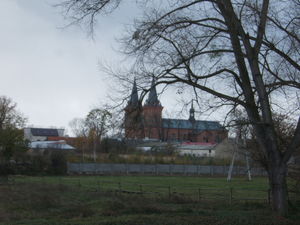 descend from the train because the bridge had been blown up, and went on foot from Ponyhowek to Nowy-Dwor where they spent the night. From there they were scattered in every direction the next day.
descend from the train because the bridge had been blown up, and went on foot from Ponyhowek to Nowy-Dwor where they spent the night. From there they were scattered in every direction the next day.
Most of them made for Warsaw.
The family of Pesah and Golda Moscovitch reached Nowy-Dwor before the expulsion. When they told the Jewish inhabitants that the Jews of Raciaz had been expelled and were on their way to Nowy-Dwor, the local Jews mobilised all the vehicles, carts and horses, etc., and sent to collect the expelled and exhausted Raciaz Jews. During the night they were given lodging in the Jewish homes, while the rest were taken to a local cinema in Lodz. Next day some went to Warsaw and others were dispersed to various places. My conclusion after all this is: if the Jews of Raciaz had refused to give the nazis 50,000 zloty as ransom on those two occasions; and if they had all gone off to Poltusk on the Russian frontier when the first expulsion was announced; and if they had crossed the frontier and advanced into Russia, then a large percentage of the Jews of Raciaz would have remained alive, like so many of the former inhabitants of Brest-Litovsk and Slonim.
*********************
On the Eve of Auschwitz
by Yakov Greenshpan
 Friday, September 1, 1939 - the fateful day in Poland. War between Poland and Germany has been declared. I am on my way to Glinovestsk, 13 kilomters from my little shtetl Racionz. My father had sent me fo sugar. About 12:00 o'clock I hear a blaring commotion. What is this? People are Milling about in the streets and furthermore I hear than this is war and that the German pilots have bombed our shtetl Racionz. I remain in the midst of all of this with a wagon sugar. I don't know what to do. At the moment my brother Leybl appears on his bicycle. He ask me if I have already paid for the sugar and if not that I should turn backwith the money because we are at war. My brother doesn't spend any time thinking any further, takes me on his bicycle and the wagon-driver goes to the shtetl with the sugar.
Friday, September 1, 1939 - the fateful day in Poland. War between Poland and Germany has been declared. I am on my way to Glinovestsk, 13 kilomters from my little shtetl Racionz. My father had sent me fo sugar. About 12:00 o'clock I hear a blaring commotion. What is this? People are Milling about in the streets and furthermore I hear than this is war and that the German pilots have bombed our shtetl Racionz. I remain in the midst of all of this with a wagon sugar. I don't know what to do. At the moment my brother Leybl appears on his bicycle. He ask me if I have already paid for the sugar and if not that I should turn backwith the money because we are at war. My brother doesn't spend any time thinking any further, takes me on his bicycle and the wagon-driver goes to the shtetl with the sugar.
I come home and I hear that the railwaystation has been bombed and that a great miracle occured - 2,000 people narrowly escaped because the bomb missed the station. The front is at Mlawa, 40 kilometers away. People from Mlawa - men, women and children are pouring into our shtetl trying to survive because all of Mlawa is under fire between the shooting at the front as well as at the bombing. Wagons moving through the streets can be seen filled with dead and wounded. The confusion is very great - the shtetl civil servants departed in their autos. Civils with red crosses on white armbands have organized to help the wounded. The sky is black with airplanes. We hide in our homes, windows covered, shutters closed and sit with gas mask protecting our faces. The house becomes stuffy and airless. Someone shouts that he smells gas. The old folks begin to cry "Shema Yisroel!" However within a few minutes we go outside and it appears that it's not true about the gas because gas is used only under extreme conditions.
 The front in Mlawa is penetrated and the talk is that in two or three days the Germans will arrive. We pack up the best provisions uc as tea, tabacco, soap, jams, chocolate and somes imported articles, place them in the wagon and leave to hide it all in grandfather Mendel Keinne's cellar. Saturday and sunday the Polish army can be seen retreating. The soldiers faces and gloomy and famished. They broke into our shop and took preserves, chocolate and various kinds of food that they found. They had already been without food for two days and they told us that the Germans would enter tomorow or the day after and it would be worse. My brother Label and Srulik, 20 and 21 years old grabbed a wagon and took off with the troops for Warsaw. We were afraid of the Germans in the aera who knew our family - the family Greenshpan. We were afraid that my brother would be captured. Bread is already in short supply in the shtetl.
The front in Mlawa is penetrated and the talk is that in two or three days the Germans will arrive. We pack up the best provisions uc as tea, tabacco, soap, jams, chocolate and somes imported articles, place them in the wagon and leave to hide it all in grandfather Mendel Keinne's cellar. Saturday and sunday the Polish army can be seen retreating. The soldiers faces and gloomy and famished. They broke into our shop and took preserves, chocolate and various kinds of food that they found. They had already been without food for two days and they told us that the Germans would enter tomorow or the day after and it would be worse. My brother Label and Srulik, 20 and 21 years old grabbed a wagon and took off with the troops for Warsaw. We were afraid of the Germans in the aera who knew our family - the family Greenshpan. We were afraid that my brother would be captured. Bread is already in short supply in the shtetl.
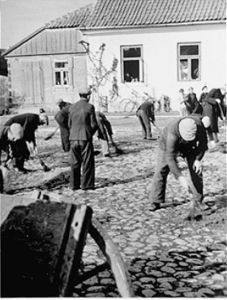 The poor arrivals, starngers from elsewhere have little or nothing to eat. They're at the synagogue and the children cry, "Mama, give me something to eat". I wander around them, take some candy and cookies out of my pockets and share them with the children. I run quickly to father and tell him that the children are hungry along with their fathers and mothers. My father was a soft-hearted man who was always active in the community. He quickly collected a few women from the shtetl, gave them a sack of rice, some twenty packages of butter and a number of necessary items. He then ran to the butcher and procured meat. The women prpared the food and the hungry people were really refreshed that day.
The poor arrivals, starngers from elsewhere have little or nothing to eat. They're at the synagogue and the children cry, "Mama, give me something to eat". I wander around them, take some candy and cookies out of my pockets and share them with the children. I run quickly to father and tell him that the children are hungry along with their fathers and mothers. My father was a soft-hearted man who was always active in the community. He quickly collected a few women from the shtetl, gave them a sack of rice, some twenty packages of butter and a number of necessary items. He then ran to the butcher and procured meat. The women prpared the food and the hungry people were really refreshed that day.
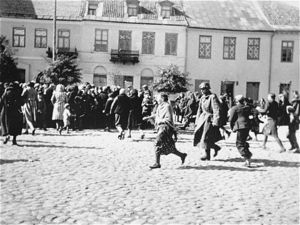 Tuesday evening Moshe, the grave digger returned from the cemetery and told us that he had seen a German patrol on the way. Wednesday the first German patrols enter our shtetl. The ride in small autos with revolvers in their hands and vicious expressions on their faces. One auto drives up to our store. Two soldiers walk forward. They're dressed in well fitting uniforms with yellow "Deutsches Reich" armbands. They shoot right into the door and tear it open. My father enters through the back door and I run through the front door. When one of them points the revolver at me, my father hurries toward them and says that I am his son. They aim their revolver at my father's head and tell him to immediately turn over the tabacco, cigarettes, and whiskey that's in the store. If not, they'll kill him. We had none of this things. My father said, "Please look around. If you find any any of this things you can shoot me". They went down in the cellar with candles, rummaged through everything, all the while shooting. They finaly let with nothing.
Tuesday evening Moshe, the grave digger returned from the cemetery and told us that he had seen a German patrol on the way. Wednesday the first German patrols enter our shtetl. The ride in small autos with revolvers in their hands and vicious expressions on their faces. One auto drives up to our store. Two soldiers walk forward. They're dressed in well fitting uniforms with yellow "Deutsches Reich" armbands. They shoot right into the door and tear it open. My father enters through the back door and I run through the front door. When one of them points the revolver at me, my father hurries toward them and says that I am his son. They aim their revolver at my father's head and tell him to immediately turn over the tabacco, cigarettes, and whiskey that's in the store. If not, they'll kill him. We had none of this things. My father said, "Please look around. If you find any any of this things you can shoot me". They went down in the cellar with candles, rummaged through everything, all the while shooting. They finaly let with nothing.
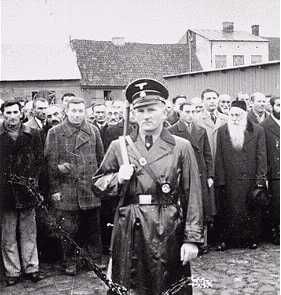 Later, more autos and more soldiers arrive and then more and more. The Poles accompagny them and show them where they can find the Jewish shops and indeed, they point to ours and the very first one. The soldiers enter help themselves to packages of candy, scatter them in the street as the frenzied mob seizes the sweets. Others come into the store and begin to robe; one grabs soap; another coffee and whatever comes to hand.
Later, more autos and more soldiers arrive and then more and more. The Poles accompagny them and show them where they can find the Jewish shops and indeed, they point to ours and the very first one. The soldiers enter help themselves to packages of candy, scatter them in the street as the frenzied mob seizes the sweets. Others come into the store and begin to robe; one grabs soap; another coffee and whatever comes to hand.
At dusk all the Jews are ordered into the marketplace. A few autos appear. A handful of individuals, dressed in black uniforms embossed with the word "Gestapo", emerge from their cars. They demand that the Jews line up in rows, ten per row. Then they order the Jews to shout in unison: " The Jews wanted this war", and other such slogans. Finally the real excercise begins.
They pull the rabbi and a few other Jews with beards off to one side, bully and ridicule them. Then they choose stout, rather sportly men, demand they lie on their backs and begin to trample upon their abdomens. Finally they call up five Jews, tie them hand and foot as one of the torturers was: "If the shtetl won't remain calm, these sackloads of hostages will be shot!" They put the five Jews in their cars and took them away. One of the tormentors takes his revolver and begins to shoot once, twice and then again and threatens. "In two minutes the marketplace had better be empty."
Everyone begins to run in great haste as the Gestapo agents shoot after them. A few victims fall to the ground. The marketplace is cleared. The terrified people, num with fear, sit in their houses staring out the windows. In the morning Germans from nearby villages enter Jewish homes and take whatever appeals to them - lovely furniture, all kinds of merchandise - anything their hearts desire.
 Within a few days England and France declare war against Germany. Renewed hope awakes in our hearts. We tell ourselves that the war won't last very long, that two such mighty nations will vanquish Germany one, two, three. Meanwhile one day passes, then another and soon almost three weeks pass and the Germans are victorious all over. They are practically in Warsaw. We see thousends of airplanes flying over our shtetl - all against Warsaw. We hear that all of Warsaw has been laid waste, in ruins.
Within a few days England and France declare war against Germany. Renewed hope awakes in our hearts. We tell ourselves that the war won't last very long, that two such mighty nations will vanquish Germany one, two, three. Meanwhile one day passes, then another and soon almost three weeks pass and the Germans are victorious all over. They are practically in Warsaw. We see thousends of airplanes flying over our shtetl - all against Warsaw. We hear that all of Warsaw has been laid waste, in ruins.
My father, mother and I are unable to eat, filled with despair. G-d knows if my two brothers are still alive. We can't sleep all night worried about them. After two weeks Waesaw falls. The Germans take over more than one-half of Poland. The Russians take over the over half. The people who had earlier fled to Warsaw began to return to their shtetls. The first returnees tell horrible stories regarding the havoc, the corpses and the extreme hunger in Warsaw. A couple of days pass but among the returnees there is no sign of my two brothers.
Traduction:
(work in process)
Bibliographie:
Daniel Tollet, Histoire des Juifs en Pologne du XVIè siècle à nos jours, PUF, 1992.
J. Baranski, "Geneza i rozwoj spolecznosci zydowskiej Raciaza w latach 1795-1864" (Genèse et développement de la population juive de Raciaz de 1795 à 1864), in BZIH (Biuletyn zydowskiego institutu historycznego w Polsce), 1986.
Annette Wieviorka et I. Niborski, Les livres du souvenir. Mémoriaux juifs de Pologne, Paris, Archives-Gallimard, 1983.
Annette Wieviorka avec Jean Baumgarten, Rachel Ertel et I. Niborski, Mille ans de cultures ashkenazes, Liana Levi, Paris, 1994.
S. Audoin-Rouzeau, A. Becker, Chr. Ingrao, H. Rousso (sous la dir. de), La violence de guerre 1914-1945 Approches comparées des deux conflits mondiaux, Editions Complexe, 2002.
Gérard Rabinovitch (sous la dir. de), Antijudaïsme et barbarie, Pardès n°38, Editions In Press, 2005.
Carol Iancu, Les mythes fondateurs de l'antisémitisme De l'Antiquité à nos jours, Privat, Toulouse, 2003.
Jean-Luc Evrard, Signes et insignes de la catastrophe De la swastika à la Shoah, Editions de l'éclat, Paris-Tel Aviv, 2005.
Jacques Attali, Les Juifs, le Monde et l'Argent Histoire économique du peuple juif, Fayard.
Joseph Schatzmiller, Shylock revu et corrigé Les Juifs, les chrétiens et le prêt d'argent dans la société médiévale, Les Belles lettres, Paris, 2000.


/https%3A%2F%2Fprofilepics.canalblog.com%2Fprofilepics%2F4%2F6%2F462705.jpg)
/https%3A%2F%2Fassets.over-blog.com%2Ft%2Fcedistic%2Fcamera.png)
/https%3A%2F%2Fstorage.canalblog.com%2F45%2F30%2F539880%2F71330987_o.jpg)
/http%3A%2F%2Fwww.objectif-info.com%2Fassets%2Ftemplates%2FAndreas2%2Fimages%2Fbtn_printer.png)